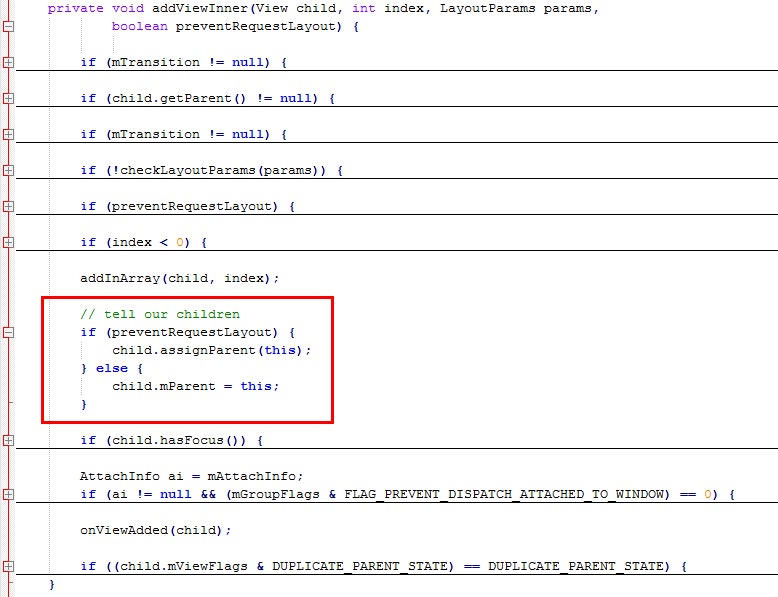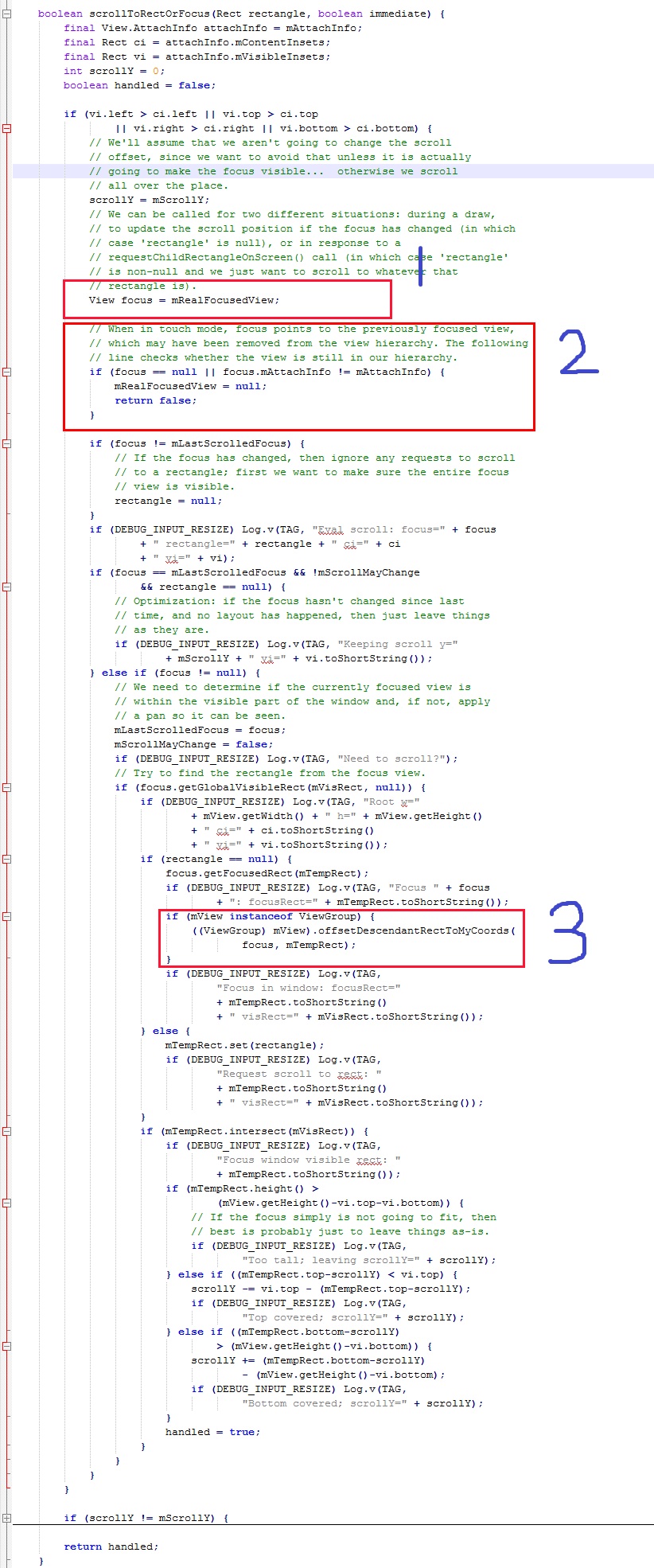【原创】【ViewFlow+GridView】Parameter must be a descendant of this view问题分析
关于ViewFlow和GridView嵌套导致Parameter must be a descendant of this view问题的解决方案
【关于ViewFlow】
ViewFlow是一款基于ViewGroup实现的可以水平滑动的开源UI Widget,可以从 https://code.google.com/p/andro-views/ 下载。
它使用Adapter进行条目绑定,主要用于不确定数目的视图间的切换,和ViewPager功能类似,但是可扩展性更强。
本例就是使用ViewFlow来实现页面水平切换。
【关于文章所用源码】
本文所属异常由于是从Android 4.2设备上抛出,所以文章内出现的所有源码都是Android 4.2源码,具体地址如下:http://grepcode.com/snapshot/repository.grepcode.com/java/ext/com.google.android/android/4.2.1_r1.2/
一、功能描述
采用ViewFlow+GridView的方式实现手势切屏功能,每屏以九宫格模式显示。
长按GridView里的Item切换到编辑模式,可以对Item进行删除。
二、复现场景
2.1 复现环境
本人拿了多款Android 4.2系列手机进行测试,目前只在两部手机上必现,在其他非 4.2 手机上偶尔出现。
华为Ascend P6,Android 4.2.2
联想K900,Android 4.2.1
2.2 复现步骤
进入应用后,以下三种操作都会导致所述问题:
1、Home到后台,再切换回来,Crash
2、长按Item,待切换到编辑模式后,Home到后台,再切换回来,Crash
3、左右切换几次屏幕,Home到后台,再切换回来,Crash
三、Crash Stack Info

1 java.lang.IllegalArgumentException: parameter must be a descendant of this view 2 at android.view.ViewGroup.offsetRectBetweenParentAndChild(ViewGroup.java:4295) 3 at android.view.ViewGroup.offsetDescendantRectToMyCoords(ViewGroup.java:4232) 4 at android.view.ViewRootImpl.scrollToRectOrFocus(ViewRootImpl.java:2440) 5 at android.view.ViewRootImpl.draw(ViewRootImpl.java:2096) 6 at android.view.ViewRootImpl.performDraw(ViewRootImpl.java:2045) 7 at android.view.ViewRootImpl.performTraversals(ViewRootImpl.java:1854) 8 at android.view.ViewRootImpl.doTraversal(ViewRootImpl.java:989) 9 at android.view.ViewRootImpl$TraversalRunnable.run(ViewRootImpl.java:4351) 10 at android.view.Choreographer$CallbackRecord.run(Choreographer.java:749) 11 at android.view.Choreographer.doCallbacks(Choreographer.java:562) 12 at android.view.Choreographer.doFrame(Choreographer.java:532) 13 at android.view.Choreographer$FrameDisplayEventReceiver.run(Choreographer.java:735) 14 at android.os.Handler.handleCallback(Handler.java:725) 15 at android.os.Handler.dispatchMessage(Handler.java:92) 16 at android.os.Looper.loop(Looper.java:137) 17 at android.app.ActivityThread.main(ActivityThread.java:5041) 18 at java.lang.reflect.Method.invokeNative(Native Method) 19 at java.lang.reflect.Method.invoke(Method.java:511) 20 at com.android.internal.os.ZygoteInit$MethodAndArgsCaller.run(ZygoteInit.java:793) 21 at com.android.internal.os.ZygoteInit.main(ZygoteInit.java:560) 22 at dalvik.system.NativeStart.main(Native Method)
四、问题分析
4.1 异常描述
首先让我们看一下这个Exception是如何抛出的。参考:http://grepcode.com/file/repository.grepcode.com/java/ext/com.google.android/android/4.2.1_r1.2/android/view/ViewGroup.java#ViewGroup
Android 4.2.1_r1.2中ViewGroup的offsetRectBetweenParentAndChild方法如下:

1 /** 2 * Helper method that offsets a rect either from parent to descendant or 3 * descendant to parent. 4 */ 5 void offsetRectBetweenParentAndChild(View descendant, Rect rect, 6 boolean offsetFromChildToParent, boolean clipToBounds) { 7 8 // already in the same coord system :) 9 if (descendant == this) { 10 return; 11 } 12 13 ViewParent theParent = descendant.mParent; 14 15 // search and offset up to the parent 16 while ((theParent != null) 17 && (theParent instanceof View) 18 && (theParent != this)) { 19 20 if (offsetFromChildToParent) { 21 rect.offset(descendant.mLeft - descendant.mScrollX, 22 descendant.mTop - descendant.mScrollY); 23 if (clipToBounds) { 24 View p = (View) theParent; 25 rect.intersect(0, 0, p.mRight - p.mLeft, p.mBottom - p.mTop); 26 } 27 } else { 28 if (clipToBounds) { 29 View p = (View) theParent; 30 rect.intersect(0, 0, p.mRight - p.mLeft, p.mBottom - p.mTop); 31 } 32 rect.offset(descendant.mScrollX - descendant.mLeft, 33 descendant.mScrollY - descendant.mTop); 34 } 35 36 descendant = (View) theParent; 37 theParent = descendant.mParent; 38 } 39 40 // now that we are up to this view, need to offset one more time 41 // to get into our coordinate space 42 if (theParent == this) { 43 if (offsetFromChildToParent) { 44 rect.offset(descendant.mLeft - descendant.mScrollX, 45 descendant.mTop - descendant.mScrollY); 46 } else { 47 rect.offset(descendant.mScrollX - descendant.mLeft, 48 descendant.mScrollY - descendant.mTop); 49 } 50 } else { 51 throw new IllegalArgumentException("parameter must be a descendant of this view"); 52 } 53 }
在方法最后可以看到该异常。那么该异常到底表示什么意思呢?若想知道答案,我们需要从该方法的实现入手。
通过注释可知,offsetRectBetweenParentAndChild方法的功能有两个:
1、计算一个Rect在某个Descendant View所在坐标系上所表示的区域或者是在该坐标系上和该Descendant View重叠的区域;
2、计算一个Rect从某个Descendant View所在坐标系折回到Parent View所在坐标系所表示的区域,即与功能1相反。
分析实现代码可以看出,它是通过所给Descendant View逐级向上寻找Parent View,同时将Rect转换到同级坐标系。在方法末尾处指出:如果最后寻找的Parent View和当前View(即调用offsetRectBetweenParentAndChild方法的View)不一致,则会抛出 IllegalArgumentException("parameter must be a descendant of this view")异常,亦即该文所指异常。
说白了,就是所给Descendant View必须是当前View的子孙.
那么,什么时候最后的Parent View和当前View不一致呢?请看下节分析。
4.2 原因探究
4.2.1 异常条件
我们来看offsetRectBetweenParentAndChild里的这段代码:

1 ViewParent theParent = descendant.mParent; 2 3 // search and offset up to the parent 4 while ((theParent != null) 5 && (theParent instanceof View) 6 && (theParent != this)) {
当Descendant View的Parent为null、非View实例、当前View时,会跳出循环进入最后的判断。排除当前View,就只剩下两个原因:null和非View实例。
这就需要探究View的Parent是如何被赋值的。
4.2.2 View内Parent的赋值入口
首先,我们从最根本的View入手。
在View源码里找到mParent的声明和赋值代码分别如下:
声明:
 View Code
View Code

1 /** 2 * The parent this view is attached to. 3 * {@hide} 4 * 5 * @see #getParent() 6 */ 7 protected ViewParent mParent;
赋值:

1 /* 2 * Caller is responsible for calling requestLayout if necessary. 3 * (This allows addViewInLayout to not request a new layout.) 4 */ 5 void assignParent(ViewParent parent) { 6 if (mParent == null) { 7 mParent = parent; 8 } else if (parent == null) { 9 mParent = null; 10 } else { 11 throw new RuntimeException("view " + this + " being added, but" 12 + " it already has a parent"); 13 } 14 }
透过上述代码,我们可以猜测mParent的赋值方式有两种:直接赋值和调用assignParent方法赋值。
4.2.3 ViewGroup为Descendant指定Parent
接下来查看ViewGroup的addView方法,并最终追踪到addViewInner方法内,注意下图红框所示代码:

红框内的代码验证了我们的猜想,即:一旦一个View被添加进ViewGroup内,其mParent所指向的就是该ViewGroup实例。很显然,ViewGroup是View的实例。这样异常条件就只剩下一种可能:Descendant View的Parent为null。
但是,什么情况下为null呢?
4.2.4 ViewGroup如何移除Descendant
查找并筛选ViewGroup内所有确定最后将Parent设置为null的方法,最后找到四个方法:
- removeFromArray(int index)------------------移除指定位置的Child
- removeFromArray(int start, int count)-------移除指定位置开始的count个Child
- removeAllViewsInLayout()---------------------移除所有Child
- detachAllViewsFromParent--------------------把所有Child从Parent中分离
从上述四个方法中不难看出,当View从ViewGroup中移除的时候,其Parent将被设为null。
由此可以断定,ViewGroup使用了一个已经被移除的Descendant View来通过offsetRectBetweenParentAndChild方法计算坐标。
那么,既然使用被移除的Descendant View必定会导致该异常,ViewGroup又为何要使用它呢?
4.3 原因深究
4.3.1 ViewGroup为何使用被移除的Descendant
我们根据Crash Stack Info追溯到ViewRootImpl类的boolean scrollToRectOrFocus(Rect rectangle, boolean immediate)方法,注意图片中红框所圈代码:

由标记1、3处代码可知,ViewGroup使用的Descendant View其实就是焦点当前真正所在的View,即Focused View。
问题就出在这里,如果Focused View是一个正常的View倒是可以,但是如果它是一个已经被移除的View,根据我们在4.2的分析可知,它的Parent为null,势必会导致所述异常。
但是,Focused View是为什么会被移除呢?
4.3.2 Focused View为什么会被移除
4.2提到的四个方法中,第三个方法removeAllViewsInLayout在移除Child Views的同时清除了Focused View的标记,排除。第四个方法detachAllViewsFromParent在Activity Destory后才调用,排除。方法一和方法二是重载方法,实现类似,可以断定Focused View肯定是在这两个方法中被移除的。
分析ViewFlow移除Child的操作,一共有两处,分别在recycleView(View v)和resetFocus()方法内。
resetFocus方法内调用了removeAllViewsInLayout方法,根据上一段分析可以安全排除。那么就剩下recycleView(View v)方法,我们来看代码:

1 protected void recycleView(View v) { 2 if (v == null) 3 return ; 4 5 mRecycledViews.add(v); 6 detachViewFromParent(v); 7 }
该方法是把ViewFlow的Child移除,并回收到循环利用列表。注意最后一行,调用了detachViewFromParent(View v)方法,代码如下:

1 /** 2 * Detaches a view from its parent. Detaching a view should be temporary and followed 3 * either by a call to {@link #attachViewToParent(View, int, android.view.ViewGroup.LayoutParams)} 4 * or a call to {@link #removeDetachedView(View, boolean)}. When a view is detached, 5 * its parent is null and cannot be retrieved by a call to {@link #getChildAt(int)}. 6 * 7 * @param child the child to detach 8 * 9 * @see #detachViewFromParent(int) 10 * @see #detachViewsFromParent(int, int) 11 * @see #detachAllViewsFromParent() 12 * @see #attachViewToParent(View, int, android.view.ViewGroup.LayoutParams) 13 * @see #removeDetachedView(View, boolean) 14 */ 15 protected void detachViewFromParent(View child) { 16 removeFromArray(indexOfChild(child)); 17 }
很明显,直接调用了removeFromArray(int index)方法,正是在4.2.4节中指出的第一个方法,而该方法已经在本节开头被确定为真凶!
设想一下,如果recycleView(View v)的参数v正是Focused View的话,Focused View就会从ViewFlow中被移除,但是当前焦点仍然在其上边。这时候offsetRectBetweenParentAndChild方法使用它必定会导致本文所指异常,这正是症结所在!
五、解决方案
5.1 普通方案与文艺方案
经过上述分析,不难想到解决方案:在ViewFlow的recycleView(View v)方法内移除View的时候,判断如果恰好是Focused View,则将焦点一并移除。
详细代码如下:

1 protected void recycleView(View v) { 2 if (v == null) 3 return; 4 5 // 方法一:普通方案,已验证可行 6 // 如果被移除的View恰好是ViewFlow内当前焦点所在View 7 // 则清除焦点(clearChildFocus方法在清除焦点的同时 8 // 也把ViewGroup内保存的Focused View引用清除) 9 if (v == findFocus()) { 10 clearChildFocus(v); 11 } 12 13 // 方法二:文艺方案,请自行验证! 14 // 下面这个方法也是把View的焦点清除,但是其是否起作用 15 // 这里不讲,请读者自行验证、比较。 16 // v.clearFocus(); 17 18 mRecycledViews.add(v); 19 detachViewFromParent(v); 20 }
注意代码内的注释。
下面附上ViewGroup.clearChildFocus(View v)和View.clearFocus()这两个方法的源码以供参考:
ViewGroup.clearChildFocus(View v):

1 /** 2 * {@inheritDoc} 3 */ 4 public void clearChildFocus(View child) { 5 if (DBG) { 6 System.out.println(this + " clearChildFocus()"); 7 } 8 9 mFocused = null; 10 if (mParent != null) { 11 mParent.clearChildFocus(this); 12 } 13 }
View.clearFocus():

1 /** 2 * Called when this view wants to give up focus. This will cause 3 * {@link #onFocusChanged(boolean, int, android.graphics.Rect)} to be called. 4 */ 5 public void clearFocus() { 6 if (DBG) { 7 System.out.println(this + " clearFocus()"); 8 } 9 10 if ((mPrivateFlags & FOCUSED) != 0) { 11 mPrivateFlags &= ~FOCUSED; 12 13 if (mParent != null) { 14 mParent.clearChildFocus(this); 15 } 16 17 onFocusChanged(false, 0, null); 18 refreshDrawableState(); 19 } 20 }
当然,解决问题方法不止一种!
5.2 2B方案
注意,该方案仅适用于ViewGroup的Child不需要获取焦点的情况,其他情况下请使用上一节介绍的方案。
既然是ViewGroup内的Focused View惹的祸,那干脆把这家伙斩草除根一了百了!
ViewGroup内的Child在获取焦点的时候会调用requestChildFocus(View child, View focused)方法,代码如下:

1 /** 2 * {@inheritDoc} 3 */ 4 public void requestChildFocus(View child, View focused) { 5 if (DBG) { 6 System.out.println(this + " requestChildFocus()"); 7 } 8 if (getDescendantFocusability() == FOCUS_BLOCK_DESCENDANTS) { 9 return; 10 } 11 12 // Unfocus us, if necessary 13 super.unFocus(); 14 15 // We had a previous notion of who had focus. Clear it. 16 if (mFocused != child) { 17 if (mFocused != null) { 18 mFocused.unFocus(); 19 } 20 21 mFocused = child; 22 } 23 if (mParent != null) { 24 mParent.requestChildFocus(this, focused); 25 } 26 }
注意第二个判断条件:如果ViewGroup当前的焦点传递策略是不向下传递,则不指定Focused View。So,下面该如何做,你懂的!整个世界清静了~作者:Nodin
出处:http://www.cnblogs.com/monodin
个人博客网站:http://www.coderself.com
关于作者:爱摄影,爱旅行,爱自由,爱生活,更要爱自己。活在当下,也在为未来打拼!
本文版权归作者和博客园共有,欢迎转载,但未经作者同意必须保留此段声明,且在文章页面明显位置给出原文链接,否则保留追究法律责任的权利。




